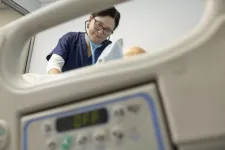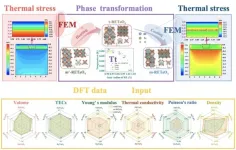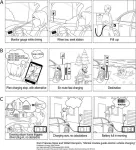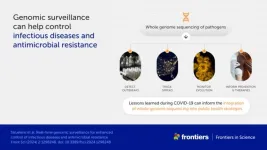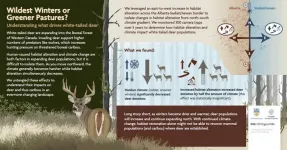(Press-News.org) HOUSTON – (April 25, 2024) – Diagnosing rare Mendelian disorders is a labor-intensive task, even for experienced geneticists. Investigators at Baylor College of Medicine are trying to make the process more efficient using artificial intelligence. The team developed a machine learning system called AI-MARRVEL (AIM) to help prioritize potentially causative variants for Mendelian disorders. The study is published today in NEJM AI.
Researchers from the Baylor Genetics clinical diagnostic laboratory noted that AIM's module can contribute to predictions independent of clinical knowledge of the gene of interest, helping to advance the discovery of novel disease mechanisms. “The diagnostic rate for rare genetic disorders is only about 30%, and on average, it is six years from the time of symptom onset to diagnosis. There is an urgent need for new approaches to enhance the speed and accuracy of diagnosis,” said co-corresponding author Dr. Pengfei Liu, associate professor of molecular and human genetics and associate clinical director at Baylor Genetics.
AIM is trained using a public database of known variants and genetic analysis called Model organism Aggregated Resources for Rare Variant ExpLoration (MARRVEL) previously developed by the Baylor team. The MARRVEL database includes more than 3.5 million variants from thousands of diagnosed cases. Researchers provide AIM with patients’ exome sequence data and symptoms, and AIM provides a ranking of the most likely gene candidates causing the rare disease.
Researchers compared AIM’s results to other algorithms used in recent benchmark papers. They tested the models using three data cohorts with established diagnoses from Baylor Genetics, the National Institutes of Health-funded Undiagnosed Diseases Network (UDN) and the Deciphering Developmental Disorders (DDD) project. AIM consistently ranked diagnosed genes as the No. 1 candidate in twice as many cases than all other benchmark methods using these real-world data sets.
“We trained AIM to mimic the way humans make decisions, and the machine can do it much faster, more efficiently and at a lower cost. This method has effectively doubled the rate of accurate diagnosis,” said co-corresponding author Dr. Zhandong Liu, associate professor of pediatrics – neurology at Baylor and investigator at the Jan and Dan Duncan Neurological Research Institute (NRI) at Texas Children’s Hospital.
AIM also offers new hope for rare disease cases that have remained unsolved for years. Hundreds of novel disease-causing variants that may be key to solving these cold cases are reported every year; however, determining which cases warrant reanalysis is challenging because of the high volume of cases. The researchers tested AIM’s clinical exome reanalysis on a dataset of UDN and DDD cases and found that it was able to correctly identify 57% of diagnosable cases.
“We can make the reanalysis process much more efficient by using AIM to identify a high-confidence set of potentially solvable cases and pushing those cases for manual review,” Zhandong Liu said. “We anticipate that this tool can recover an unprecedented number of cases that were not previously thought to be diagnosable.”
Researchers also tested AIM’s potential for discovery of novel gene candidates that have not been linked to a disease. AIM correctly predicted two newly reported disease genes as top candidates in two UDN cases.
“AIM is a major step forward in using AI to diagnose rare diseases. It narrows the differential genetic diagnoses down to a few genes and has the potential to guide the discovery of previously unknown disorders,” said co-corresponding author Dr. Hugo Bellen, Distinguished Service Professor in molecular and human genetics at Baylor and chair in neurogenetics at the Duncan NRI.
“When combined with the deep expertise of our certified clinical lab directors, highly curated datasets and scalable automated technology, we are seeing the impact of augmented intelligence to provide comprehensive genetic insights at scale, even for the most vulnerable patient populations and complex conditions,” said senior author Dr. Fan Xia, associate professor of molecular and human genetics at Baylor and vice president of clinical genomics at Baylor Genetics. “By applying real-world training data from a Baylor Genetics cohort without any inclusion criteria, AIM has shown superior accuracy. Baylor Genetics is aiming to develop the next generation of diagnostic intelligence and bring this to clinical practice.”
Other authors of this work include Dongxue Mao, Chaozhong Liu, Linhua Wang, Rami AI-Ouran, Cole Deisseroth, Sasidhar Pasupuleti, Seon Young Kim, Lucian Li, Jill A.Rosenfeld, Linyan Meng, Lindsay C. Burrage, Michael Wangler, Shinya Yamamoto, Michael Santana, Victor Perez, Priyank Shukla, Christine Eng, Brendan Lee and Bo Yuan. They are affiliated with one or more of the following institutions: Baylor College of Medicine, Jan and Dan Duncan Neurological Research Institute at Texas Children’s Hospital, Al Hussein Technical University, Baylor Genetics and the Human Genome Sequencing Center at Baylor.
This work was supported by the Chang Zuckerberg Initiative and the National Institute of Neurological Disorders and Stroke (3U2CNS132415).
# # #
END
Using AI to improve diagnosis of rare genetic disorders
2024-04-25
ELSE PRESS RELEASES FROM THIS DATE:
Study unveils balance of AI and preserving humanity in health care
2024-04-25
Cross Country Healthcare, Inc. (NASDAQ: CCRN), a pioneering force in tech-driven workforce solutions and advisory services, in collaboration with Florida Atlantic University's Christine E. Lynn College of Nursing, released its latest research findings in the fourth annual installment of the Future of Nursing Survey: “Embracing Technology While Preserving Humanity.” Drawing insights from more than 1,100 nursing professionals and students, the study illuminates the intricate interplay between cutting-edge health care technologies and the enduring essence of compassionate care.
Survey results reveal a nuanced perspective among nurses toward the integration of Artificial ...
Capturing and visualizing the phase transition mediated thermal stress of thermal barrier coating materials via a cross-scale integrated computational approach
2024-04-25
Thermal barrier coatings (TBCs) are widely used in gas turbine engines to obtain elevated working temperatures and improve engine efficiency. The phase transition of the ceramic layer is accompanied by a large volume difference, causing the concentration of thermal stress, eventually leading to TBCs to fall off and fail. Therefore, it is necessary to quantitatively evaluate the magnitude and distribution of thermal stress induced by phase transition in the ceramic layer.
A team of material scientists led ...
Study reveals emotional turmoil experienced after dog-theft is like that of a caregiver losing a child
2024-04-25
A new study published in the journal Animal-Human Interactions reveals that emotional turmoil experienced by dog owners after their pet has been stolen is like that of losing a loved one such as a caregiver losing their child.
The findings empirically support the notions that the ‘owner’ or guardian roles and relationships equate to familial relationships and, when faced with the theft of their pet, owners feel a similar sense of disenfranchised grief and ambiguous loss.
In the study, some participants felt the loss was more intense ...
PhRMA Foundation awards $1M for equity-focused research on digital health tools
2024-04-25
The PhRMA Foundation (PhF) awarded $500,000 grants to David G. Armstrong, DPM, MD, PhD, of the University of Southern California and Nino Isakadze, MD, MHS, of Johns Hopkins University to conduct research using digital health technologies (DHTs) to improve health equity and health outcomes for patients.
Armstrong and Isakadze were selected out of a group of seven researchers awarded $25,000 planning grants in 2023 by the Foundation to develop comprehensive research proposals to study the use of DHTs for advancing patient health, especially in underserved populations.
“Digital ...
Women with heart disease are less likely to receive life-saving drugs than men
2024-04-25
Athens, Greece – 25 April 2024: Women with heart disease are less often treated with cholesterol-lowering drugs than men, according to research presented today at ESC Preventive Cardiology 2024, a scientific congress of the European Society of Cardiology (ESC).1
“Cholesterol-lowering drugs save lives and prevent heart attacks, and should be prescribed to all patients with coronary artery disease,” said study author Dr. Nina Johnston of Uppsala University, Sweden. “Unfortunately, our study shows that women are missing out on these essential medications.”
Patients with ...
How electric vehicle drivers can escape range anxiety
2024-04-25
Two of the biggest challenges faced by new and potential electric vehicle (EV) drivers are range anxiety and speed of charging, but these shouldn’t have to be challenges at all. That is according to a study by Chalmers University of Technology, Sweden, and the University of Delaware, USA. Researchers discovered that a change in refuelling mindset, rather than improving the size or performance of the battery, could be the answer to these concerns.
The transition from filling up at a petrol station to recharging your electric vehicle in the most convenient location for you, requires a whole new way ...
How do birds flock? Researchers do the math to reveal previously unknown aerodynamic phenomenon
2024-04-25
In looking up at the sky during these early weeks of spring, you may very well see a flock of birds moving in unison as they migrate north. But how do these creatures fly in such a coordinated and seemingly effortless fashion?
Part of the answer lies in precise, and previously unknown, aerodynamic interactions, reports a team of mathematicians in a newly published study. Its breakthrough broadens our understanding of wildlife, including fish, who move in schools, and could have applications in transportation and energy.
“This area of research is important since animals are known to take advantage of the flows, such as of air or water, left by other members of ...
Experts call for global genetic warning system to combat the next pandemic and antimicrobial resistance
2024-04-25
The Covid-19 pandemic turned the world upside down. In fighting it, one of our most important weapons was genomic surveillance, based on whole genome sequencing, which collects all the genetic data of a given microorganism. This powerful technology tracked the spread and evolution of the virus, helping to guide public health responses and the development of vaccines and treatments.
But genomic surveillance could do much more to reduce the toll of disease and death worldwide than just protect us from Covid-19. Writing in Frontiers in Science, an international collective of clinical and public health microbiologists ...
Genetic variations may predispose people to Parkinson’s disease following long-term pesticide exposure, study finds
2024-04-25
A new UCLA Health study found certain genetic variants could help explain how long-term pesticide exposure could increase the risk of Parkinson’s disease.
While decades of research have linked pesticide exposure and Parkinson’s disease risk, researchers have sought to explain why some individuals with high exposure develop the disease while others do not.
One longstanding hypothesis has been that susceptibility to the disease is a combination of both environmental and genetic factors.
The new study, published in the journal NPJ Parkinson’s Disease, used genetic data from nearly 800 Central Valley (California) residents with Parkinson’s ...
Deer are expanding north, and that’s not good for caribou
2024-04-25
As the climate changes, animals are doing what they can to adapt.
Researchers from UBC Okanagan—which includes partners from Biodiversity Pathways’ Wildlife Science Centre, the Alberta Biodiversity Monitoring Institute, the University of Alberta, and Environment and Climate Change Canada—wanted to evaluate why deer densities in the boreal forest are rapidly increasing.
Over the past century, white-tailed deer have greatly expanded their range in North America, explains Melanie Dickie, a doctoral student with UBC Okanagan’s Wildlife Restoration Ecology Lab.
In the boreal forest of Western Canada, ...
